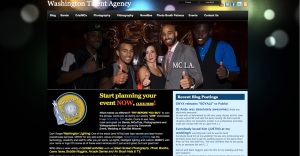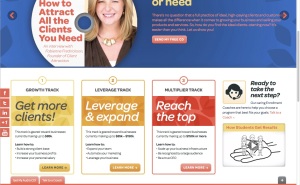Online marketing for “multipassionate” entrepreneurs

photo credit: YIP Day 151 – Kitchen Shelf via photopin (license)
Often, I get the question, “I do so many different things. How do I put them all on my website?”
The answer, like with most questions, is: “It depends.”
Let’s start with the easiest scenario to address. Suppose you are a “multipassionate” freelancer, a jack of all trades who sings and also crafts sock puppets and sells them online. Or a psychotherapist who owns a banana plantation on the side. Wouldn’t it be easier for all your potential customers if they could find everything you do in one place?
Bluntly, no. Sure, it would be more convenient for you to build and maintain just one website, but remember that a business website does not perform the same function as a personal blog or even an online resume. Cramming unrelated activities onto one site looks cobbled together and makes you seem unfocused.
Your clients don’t necessarily care how well-rounded you are as an entrepreneur. And frankly, they may not want to know what other pursuits you have that take time away from THEIR concerns.
Remember that each one of us has a tiny, reptile part of our brain that fervently believes It’s all about ME. That’s the part of the customer’s brain you should be aiming for when you design your business website.
Put differently, online marketing is all about making sure the right audience finds the right thing you are selling.
Now, let’s say you own a single business that provides more than one product or service. Ask yourself if your various offerings serve the same or different audiences.
For example, this is the website for an organization called Washington Talent:
At first glance it might not be obvious what Washington Talent does. The top menu includes seemingly unrelated services like music (bands), videography, novelties (whatever!) and something called “photobooth palooza.”
But if you are a professional event planner or a person throwing a wedding reception, this combination of services, along with a giant call to “Start planning your event now,” it all makes perfect sense.
Sure, a corporate event planner is technically a different entity from a couple planning their wedding, but both are ultimately looking for the same thing – a group of services that, taken together, spells “party.”
By contrast, here is a business that on that surface, appears to offer once service―small business coaching:
In in a sense it is for “one” audience, but a closer look reveals that owner Fabienne Frederickson has actually segmented her audience into three categories, and her site directs each segment to a separate track: If you are in the initial stage and just need more clients in order to survive, click on the GROWTH track…if you are in a more advanced stage and are ready to use what you have built as leverage to expand your business, click on the LEVERAGE track; and if your business is already earning over $150k and you are ready to go big, click on the MULTIPLIER track.
As a coach, Fabienne knows that small business owners at different stages in the life cycle of their company each have very distinct needs. She has therefore developed a different package for each group and invites potential clients to self-select by revenue level.
Psychologically, this audience segmentation has a similar effect as the product differentiation on the Washington Talent website: both offer potential customers additional ways in which they might use this business’s services beyond what they originally came to the site for.
Just as Washington Talent makes it easy for someone simply looking for a wedding reception DJ to think about also hiring a videographer to capture the fun, Fabienne’s Client Attraction site subtly suggests ways to continue to work together in the future. It seems to say: Hey – you might only be ready for the Growth Track now, but sign up for my business school and in no time you’ll be set to franchise yourself. There’s a progression that puts you in mind to keep going up the ladder.


